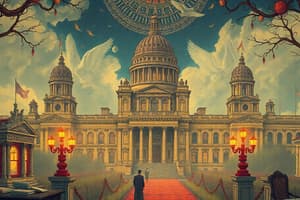Podcast
Questions and Answers
What does the phrase 'prole feed' refer to in popular culture?
What does the phrase 'prole feed' refer to in popular culture?
- Luxury entertainment for the elite class
- Propaganda aimed at the general population
- Entertainment created specifically for the working class (correct)
- High-quality, intellectually engaging content
Where does the term 'prole' come from?
Where does the term 'prole' come from?
- From Orwell's fictional world (correct)
- From modern political discourse
- From sociological studies of class structures
- From historical records of the working class
What does the text say about the concept of being 'prole'?
What does the text say about the concept of being 'prole'?
- It is a negative stereotype derived from fiction, not reality (correct)
- It is a term used exclusively by the elite class to describe the masses
- It is a positive label that the working class embraces
- It accurately reflects the real-world experiences of the working class
How do some characters in fiction view their 'prole' status?
How do some characters in fiction view their 'prole' status?
What does the text say about the current significance of the term 'prole'?
What does the text say about the current significance of the term 'prole'?
Which of the following best summarizes the overall message of the text?
Which of the following best summarizes the overall message of the text?
What term did George Orwell coin in his novel 'Animal Farm'?
What term did George Orwell coin in his novel 'Animal Farm'?
How were the proles described in Orwell's fictional world?
How were the proles described in Orwell's fictional world?
What does the term 'prole' mean when applied to lower classes?
What does the term 'prole' mean when applied to lower classes?
Which term was commonly used to describe the working class before World War II?
Which term was commonly used to describe the working class before World War II?
According to Orwell, what distinguishes proles from proletarians?
According to Orwell, what distinguishes proles from proletarians?
What relevance does the term 'prole' still hold today?
What relevance does the term 'prole' still hold today?
Flashcards are hidden until you start studying
Study Notes
Being a Prole
A term coined by George Orwell in his dystopian novel Animal Farm, a prole is someone who belongs to the lowest class of workers. In Orwell's fictional world, proles were characterized as uneducated and apathetic, with little ability to think critically. They formed the majority of society, performing manual labor while animals held positions of leadership. While this concept was a product of fiction, the term has been used in various contexts since its introduction.
Historical Context
The word "prole" itself originates from Latin through French and means "offspring," "descendant," or "issue." However, it acquired a specific social meaning when applied to the lower classes in English literature during the early part of the twentieth century.
In real life, the term "proletariat" was commonly used to describe the working class before World War II. Later, upon the postwar emergence of industrial societies, the term became obsolete. It continues to have some relevance today in Marxist thought.
Orwell himself wrote on the subject of "Proles and Revolution":
"Proles are not proletarians... Never yet has any proletarian revolution succeeded in putting forward a programme which can really claim the support of the mass of the population... So far as I know, nobody has ever defined what he means by 'the masses,' but one may take it that whatever else they are, they are not proles".
Cultural Significance
In popular culture, the phrase "prole feed" refers to entertainment created specifically for the working class, often derided as formulaic and lacking depth. This term comes from Orwell's fictional world, where he describes mass entertainment geared toward proles as low quality, easily digestible content for a population that doesn't require much mental engagement.
The concept of being "prole" evokes images of a certain stereotypical lifestyle, but these ideas come largely from fiction rather than reality. However, even within fiction, there are nuances to consider when discussing characters as being prole. For example, some characters may feel elevated by their status while others might see it as something to escape.
Conclusion
In summary, the term "prole," though rooted in literature and society, does not hold significant weight outside of specific contexts such as entertainment culture. Its meaning has evolved over time, reflecting changes in societal structures and perceptions of class hierarchy. While the idea of a working class struggling against elite rule can still resonate today, the label "prole" itself remains more a vestige of history than a current social identifier.
Studying That Suits You
Use AI to generate personalized quizzes and flashcards to suit your learning preferences.




